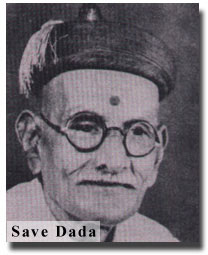Come May 3, 2013 and India's film industry will be celebrating the hundredth year of its birth, for it was on this day exactly a hundred years ago that Raja Harishchandra, supposedly the first Indian film made by the first Indian filmmaker Dadasaheb Phalke, hit theatre screens. In a country known for its lackluster approach to film preservation (bar the efforts of PK Nair, founder of the National Film Archive of India, on whom a documentary, Celluloid Man was recently made, which I have written about here), the fact that we have got the date on which the film was released right is indeed remarkable. But is Raja Harishchandra really India's first film?
A little more probing would reveal that there have been films made in the country before Phalke's feature debut. Shortly after the Lumiere brothers screened their "actualities" in Bombay (As Mumbai was officially called then) in the late 1890s, a certain Harishchandra Sakharam Bhatwadekar, or Save Dada, a portrait photographer, made a series of factual films a la the Lumiere Brothers in India, the first of which was a wrestling match between two well known wrestlers of the time, in 1899. He even filmed perhaps India's first newsreel, the arrival of RP Paranjpe, a successful mathematician, from Cambridge in 1901.
In fact, the non-fiction cinema seemed to have been active in India well before Phalke made his entry. By the first decade of the 20th century, cinemas were already established in major cities of the country like Calcutta, Madras and Bombay (though it could be assumed that these theatres screened largely foreign films, like those of George Melies and Edwin Porter). Very soon, Bhatwadekar was joined by other names like Narayan G Devare, the Patnakar brothers and Hiralal Sen, who made factual films that documented day-to-day life in India. A company dedicated to filming newsreels, the Calcutta Film Gazette, was also started during this period.
Despite these facts, the credit for making the first Indian film has always gone to Dundiraj Govind Phalke, partly because none of the films before Raja Harishchandra have survived and also because of the fact that the documentary, or non-fiction film has never been taken seriously in India. But such a claim would be tantamount to assuming that the father of film would be George Melies and not the Lumiere Brothers or Edison.
What makes this celebration even more interesting is the fact that most histories of Indian cinema do recognise the earlier pioneers but since Harishchandra was the first full length motion picture made entirely by an Indian crew, at a full six reels (of which only two have survived) the film and its maker have been accorded first Indian film and first Indian filmmaker respectively. Nowhere do you find a voice that challenges this assumption.
Well, yes, there has been a challenge to this assumption, but of a wholly different kind. The argument that generally goes around is that it is not with Phalke's Harishchandra, but with Satyajit Ray's Pather Panchali that Indian cinema really begins. Mrinal Sen has been the most vocal about this stance. Though there is no doubting the greatness of Pather Panchali and the fact that it paved the path for a more personal cinema in India, such a claim only amounts to elitism. Yet it could generally be accepted that few filmmakers in India before Ray approached cinema in a wholly original way without the trappings of the theatre or literature. But it does not call for overlooking the achievements of the earlier filmmakers.
So will this piece initiate any debates on the real beginnings of Indian cinema? Very unlikely. Meanwhile, the celebration of our cinema's hundredth anniversary will be celebrated with full pomp and the glorious "achievements" of mostly Bollywood cinema will be glorified as part of the celebrations.
.JPG/585px-Raja_Harischandra_(1913_film).JPG)


No comments:
Post a Comment